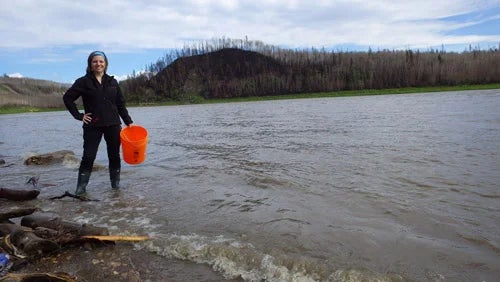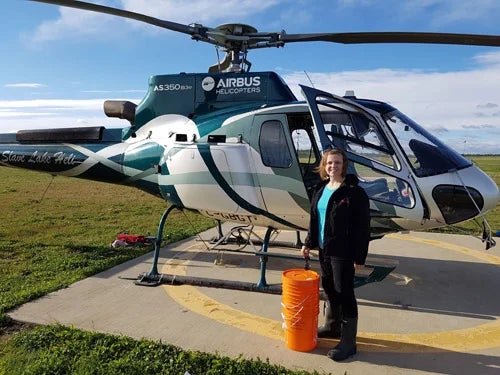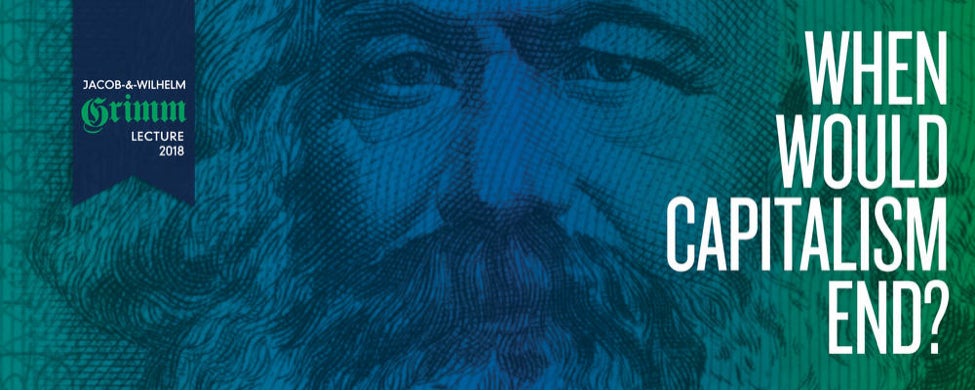Editor:
Brandon Sweet
University Communications
bulletin@uwaterloo.ca
Long-term effects of forest fires pose threats to drinking water
This article originally appeared on the Water Institute's news website
Forest fires are sweeping North America with detrimental environmental, economic and human impacts. A research team, led by University of Waterloo Engineering professor Monica Emelko, will receive $5.5 million from the Natural Sciences and Engineering Research Council of Canada’s (NSERC) Strategic Partnership Grant for Networks to provide new knowledge on the impacts of different forest management strategies on drinking water source quality and treatability. The network is co-led by professor Uldis Silins, a forest hydrologist from the University of Alberta, with whom Emelko co-leads the Southern Rockies Watershed Project. They were the first group cited by the Intergovernmental Panel on Climate Change in identifying climate change-associated threats to global drinking water security through water quality.

“High-quality water supplies such as those in many parts of North America are at greatest risk from the threats of natural disturbances such as wildfires and floods,” said Monica Emelko, professor in the Department of Civil and Environmental Engineering and University of Waterloo Water Institute member. “These disturbances, exacerbated by climate change, are increasing in severity and are likely to result in a long-lasting legacy of water quality deterioration in several parts of Canada.”
In Ontario alone, there have been over 120 fires this summer, according to the Ministry of Natural Resources and Forestry. Disturbances like forest fires are having an increasingly negative effect on source water and are posing a challenge to the design and operational response capacities of water quality treatment plants. In some cases, such disturbances have caused service disruptions.
While forest management impacts on water have been well studied, little if any of that work has focused specifically on impacts to drinking water treatability. Emelko’s network forWater – brings together researchers, government agencies and industry professionals from different disciplines across Canada who are focused on understanding and developing response strategies to climate change threats.
“Canada is neither unique nor exempt from climate change threats,” said Emelko. “Increasing swings in weather—rainy periods followed by long, dry hot periods—enhance the growth of vegetation that fuels wildfires in many regions. Fire danger increases with the right combination of temperature, humidity, winds, and rainfall. More days of higher fire danger means more risk of wildfires—it’s not ‘if,’ but ‘when’. And our water supplies are often especially vulnerable.”

Safe drinking water is one of society's most critical needs. Most Canadians are just becoming aware of how fragile this essential resource is, and of the potentially catastrophic effects that natural disturbances—intensified by climate change—can have on drinking water security.
“The water used by the majority of Canadians, Americans, and many others globally originates in forests,” said Emelko. “Traditional approaches for protecting these critical water supplies cannot protect them from the potentially devastating effects of mother nature. The forWater Network is leveraging diverse expertise in water quality and treatment, hydrology, forest management, and resource economics to provide the critical new knowledge and technologies needed to build resilient, adaptive communities. This starts by ensuring water security in Canada and globally.”
2018 Grimm Lecture takes on Marx at 200

The Waterloo Centre for German Studies is kicking off the new academic year by inviting Gareth Stedman Jones, FBA, to give this year’s Jacob & Wilhelm Grimm Lecture.
Prof. Stedman Jones is affiliated with Cambridge University and Queen Mary, University of London. In his groundbreaking 2016 biography Karl Marx: Greatness and Illusion, Stedman Jones separates Marx from Marxism in order to better understand Marx’s original ideas. 2018 is the bicentennial of Karl Marx’s birth, and to mark the event Stedman Jones will investigate whether or not Marx believed what would become a central tenet of 20th-century Marxism, namely that capitalism would eventually collapse.
The 2018 Grimm Lecture, “When Would Capitalism End?,” is being held at the CIGI Auditorium on Thursday, September 20 at 7:00 p.m., followed by a Q&A moderated by Dean of Arts Doug Peers and a reception open to all. More information and a link to register for this free event can be found on the Waterloo Centre for German Studies website.
The annual Grimm Lecture aims to bring members of the university and wider communities together to learn about a topic of general interest in German studies. Previous speakers have included Timothy Snyder, Alice Kuzniar, and Eric Rentschler. This year’s lecture is co-sponsored by the Balsillie School of International Affairs, the Dean of Arts, and the departments and programs of English Language and Literature, Global Engagement, History, Philosophy, and Sociology and Legal Studies.
Provide feedback on new Tri-Agency research fund and other notes
Researchers interested in providing feedback on the proposed funding design for a new Tri-Agency Fund are invited to take part in the Canada Research Coordinating Committee (CRCC) Consultation online questionnaire by August 27.
CRCC will be designing a new Tri-Agency Fund to foster multidisciplinary collaborations, and support international, fast-breaking, and high-risk research to ensure that Canada excels in the research enterprise of the future.
Results will be posted in fall 2018 and it’s expected that the feedback will ultimately shape the next generation of research in Canada. If you have any questions, please contact Leslie Copp.
Just a reminder that Mathematics & Computer (MC) will be closed for an electrical upgrade from August 21 – August 29, 2018.
Alternate Office locations for Faculty of Mathematics services during the shutdown are:
|
Department |
Building |
Email Address |
|
Dean of Mathematics Office |
DC 1312/DC 1316 |
|
|
Mathematics Undergraduate Office |
DC 2136 |
x33905, mathuo@uwaterloo.ca |
|
Mathematics Graduate Office |
DC 2320 |
|
|
Mathematics Faculty Computing Facility (MFCF) |
M3 2101 |
x36323, mfcfhelp@uwaterloo.ca |
Open work space for any student or faculty member wishing to be on campus during the shutdown will be located in M3 1006.
If you have questions or concerns, please contact Christina McDougall, Administrative Manager, Faculty of Mathematics at cmcdougall@uwaterloo.ca
For more information, please visit the Faculty of Mathematics shutdown page.
Link of the day
When and where
Deadline for students to get "Fees Arranged," Wednesday, August 22.
Research ethics system training, Wednesday, August 22, 9:00 a.m. to 10:30 a.m., EC5 3167 (please bring a laptop). For all upcoming sessions, please visit the Research ethics system webpage.
Velocity Science Graduate Office Hours: Book a time-slot, Wednesday, August 22, 10:30 a.m. to 1:00 p.m., STC 2002.
Multi-Year Accessibility Plan information session, Wednesday, August 22, 12:00 p.m. to 1:00 p.m., BMH 1016.
Research ethics system training, Thursday, August 23, 9:00 a.m. to 10:30 a.m., EC5 3167 (please bring a laptop). For all upcoming sessions, please visit the Research ethics system webpage.
Indigenous cultural sensitivity workshop, Thursday, August 23, 9:30 a.m. to 11:30 a.m., location TBD. Note: this event has been postponed.
Co-operative work term ends, Friday, August 24.
Warriors Football Home Opener vs. Windsor, Staff and Faculty Day, First Responders and Military Appreciation Day, Minor League Day. Sunday, August 26, 7:00 p.m., Warrior Field. Staff and Faculty: email to request code for free tickets.
QPR Training, Monday, August 27, 10:30 a.m., Needles Hall 2nd Floor.
Research ethics system training, Tuesday, August 28, 9:00 a.m. to 10:30 a.m., EC5 3167 (please bring a laptop). For all upcoming sessions, please visit the Research ethics system webpage.
WatCACE seminar featuring Professor Kate Lloyd, Associate Professor and Director for Learning, Teaching and Research in PACE at Macquarie University, Australia, “A Holistic Approach to Evaluating Macquarie University's Institution-Wide Work-Integrated Learning Program - Professional and Community Engagement (PACE)”, Tuesday, August 28, 10:00 a.m. to 11:30 a.m., EC5 1111.
Research ethics system training, Wednesday, August 29, 9:00 a.m. to 10:30 a.m., EC5 3167 (please bring a laptop). For all upcoming sessions, please visit the Research ethics system webpage.
Waterloo Women's Wednesdays: Knit & Nourish, Wednesday, August 29, 12:00 p.m., DC 1301.
Single & Sexy Premiere Performance, Friday, August 31, 10:45 a.m., Physical Activities Complex.
Labour Day, Monday, September 3, most University operations closed.
Research ethics system training, Tuesday, September 4, 9:00 a.m. to 10:30 a.m., MC 1078. For all upcoming sessions, please visit the Research ethics system webpage.
Music Department Ensemble Auditions for Fall 2018, Thursday, September 6 to Friday, September 21, Conrad Grebel University College.
Feds Welcome Week, Monday, September 10 to Friday, September 14.